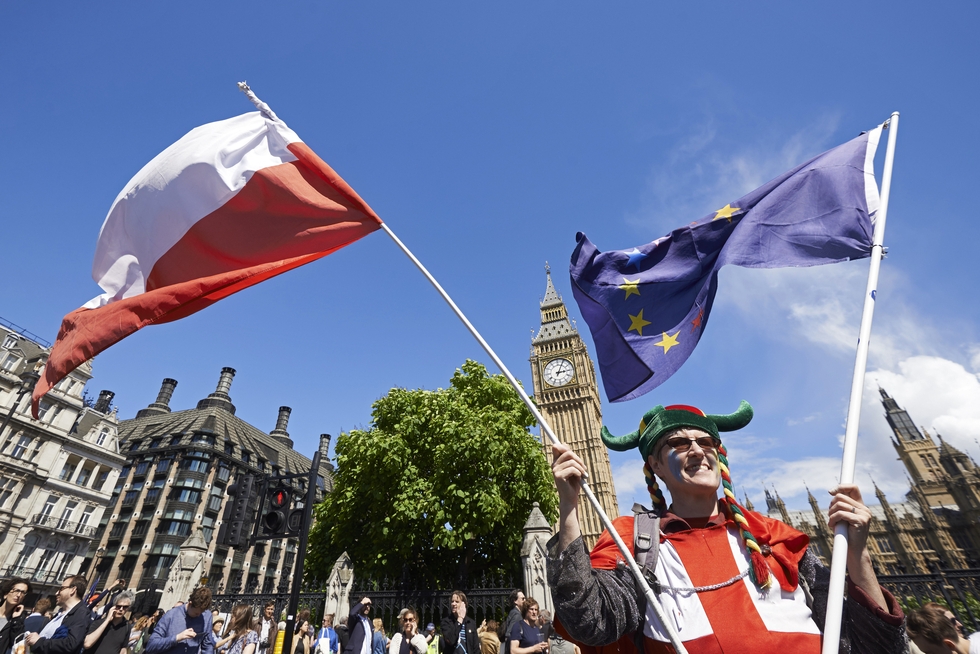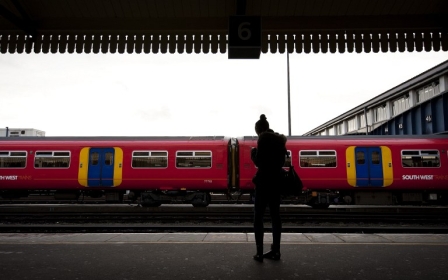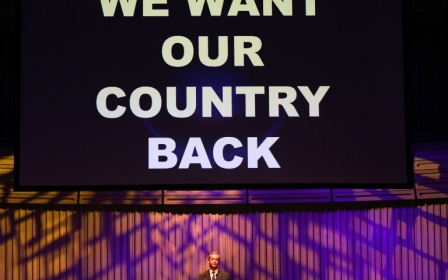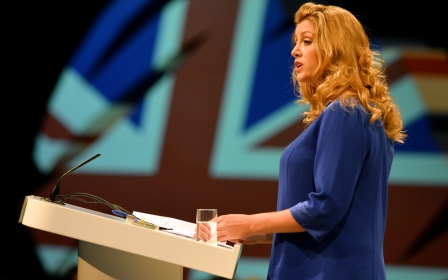After Brexit, Poles get a taste of their own country’s hostility to minorities

Ever since Britain voted to leave the European Union, a day has not passed without media reports of incidents of racially motivated abuse. According to police sources, there has been a fivefold increase in the number of reported incidents since the referendum on 23 June.
Added to the list of familiar scapegoats, in particular Muslims and non-white immigrants, are now EU citizens, who increasingly find themselves at the receiving end of the campaign of animosity sparked by the referendum result.
Two of the most-discussed racial violence incidents that took place in the immediate aftermath of the referendum were directed against the Polish community in the UK. “Leave the EU/No more Polish Vermin” were the words written on laminated cards put through the letterboxes of Polish families in Cambridgeshire, and distributed near local schools. In London, the building that hosts the Polish Social and Cultural Association was daubed with graffiti telling Poles in unambiguous terms to “Go home.” A number of other attacks was reported on social media. The incidents prompted the Polish ambassador in the UK to call on British authorities to condemn Brexit-related hate crimes.
Although anti-Polish sentiment in the UK is not new, the almost one-million strong community had never been targeted with such fervour, possibly due to the fact it hails from a predominantly Christian and white country. However, the climate of animosity created by the Leave campaign, which focused heavily on the supposedly dire consequences of immigration from Eastern Europe, has left many Poles fearing for their safety.
This fear has been echoed by leading Polish politicians back home, many of whom had not shied away from anti-EU and anti-immigrant rhetoric in the past. One of them, Jarosław Kaczynski, the leader of the ruling Law and Justice party (PiS), became the first European leader to openly call on the UK to conduct a second referendum.
PiS won the October 2015 parliamentary election in Poland on a vehemently anti-refugee and Eurosceptic platform. Kaczynski was accused of scaremongering when during an election campaign meeting he claimed that refugees could carry “various parasites” and “protozoa”. Countering the European health authorities, he said: “"There are already signs of emergence of diseases that are highly dangerous and have not been seen in Europe for a long time: cholera on the Greek islands, dysentery in Vienna. There is also talk about other, even more severe diseases."
The party consistently criticised European Union’s plans to shelter refugees more evenly across the continent, which urged Poland, with its population of almost 40 million, to meet its quota of 7000, or provide £1.25bn in support for the humanitarian effort. Kaczynski said that “such a decision would abolish the sovereignty of EU member states”, and that Poland wouldn’t accept a single refugee because “there is no mechanism that would ensure safety". Konrad Szymański, Poland’s minister for European affairs, branded the proposal “dead”.
Although the party did reluctantly accept the allocated quota, its xenophobic rhetoric reinforced the already negative perception about refugees and immigrants held by a significant portion of the Polish society.
According to a survey by CBOS, a pollster, published in December 2015, only 5 percent of respondents thought Poland should accept refugees from war-torn countries. As many as 53 percent were opposed, and 37 percent thought asylum should only be temporary.
Some analysts believed that respondents’ views might have been influenced by the November attacks in Paris. Others pointed to the fact that Poland has never had a serious, informed public debate on immigration, and the society lacked fundamental education on the EU’s moral obligation to help those seeking shelter.
Hostility to foreigners
Widespread hostility towards foreigners had been revealed by a study in 2013 by the Centre for Research on Prejudice, an academic centre at the University of Warsaw. It found that almost 70 percent of Poles did not want non-white people living in their country, and that the vast majority thought immigrants take away jobs from Polish workers.
A study in 2015 by the centre revealed an alarmingly negative attitude towards Muslims and Islam. Around 20% of respondents declared they would not want to work alongside a Muslim colleague, one third would not like a Muslim as their neighbour, and around half would not marry a Muslim. Over 50 percent associated Islam with terrorism and thought it constituted a threat to Polish culture and traditions.
Paradoxically, the markedly negative attitude towards “the other” is often explained partly as a result of a lack of exposure to foreigners, and excessive reliance on politicians’ statements and media reports in forming an opinion. Foreigners represent less than 0.5 percent of the population, with Ukrainians being by far the most numerous minority.
According to various statistics, there are between 350,000 and 800,000 Ukrainian nationals living in Poland. A more tolerant stance towards this particular community might be due to the fact Poles seem to be much more welcoming towards people of white skin and a Christian faith than anyone else.
Only Christians welcome
Estera, a private foundation headed by Miriam Shaded, a Polish-Syrian Christian, aims to help suffering Syrians relocate to Poland. On its website, it boasts of having facilitated a transfer of 150 people, many of whom are children. The organisation’s mission statement includes “protection of life and health”, “protection of constitutional rights” and “informational ‘resistance movement’”, in the spirit of Christianity.
However, to qualify for the foundation’s help, the refugee needs to be Christian.
However, Estera’s activities have been widely branded as noble by Poles. Andrzej Duda, the president of Poland, noted during a presidential election debate that Syrian Christians “will be well-received here” since they are “culturally similar to us, and one should be concerned about the situation of Christians in the world”.
Witold Waszczykowski, now the minister of foreign affairs, said: “Since we have been forced to make such decisions, it’s good to have control over these refugees. They should be Christians as it gives some hope that they will assimilate well in Poland.”
This sort of divisive rhetoric raises few eyebrows in Poland, a country whose society prides itself on its religiosity. The widespread prejudice against refugees prompted the Polish Catholic Church authorities to issue a public appeal to remind the faithful that it is a moral duty to help all those fleeing wars and persecution, regardless of their religious belief.
Yet, recently there has been an increase in the number of violent incidents. According to Poland’s Human Rights Ombudsman, racially motivated physical attacks on foreigners occur “more or less once a week, or every two weeks”.
Hate speech, validated by politicians’ sensationalist headline and politicians’ irresponsible scaremongering, has also been on the rise. In September 2015, during a countrywide protest named “Poles against Immigrants” organised by far-right groups, a poster claiming that Muslims are “Trojan pigs” was seen in Warsaw. In Gdansk, protestors chanted “We will do to you what Hitler did to the Jews.”
'Reopen the gas chambers'
A prosecutor’s office in Warsaw launched a probe after a number of comments were posted on Facebook calling for the reopening of Auschwitz, the Nazi concentration camp, and the extermination of refugees arriving in Poland in its gas chambers. One comment read “The Arabs are coming :)))”, another suggested handing refugees a “one-way ticket”.
Being the largest recipient of EU funds and benefitting enormously from free movement of people, Poland has a moral duty to take a more pro-active role in the European effort of assisting those fleeing conflict. Paradoxically, Brexit and the increased animosity towards Poles in the UK could serve a starting point for a much-needed debate and reconsideration of Poland’s own unsavoury treatment of minorities.
Few would argue that those who distributed the “Polish vermin” cards spoke for the British people, and those affected have every right to seek assurances that their personal safety will not be compromised.
However, for Poland to be seen as a modern European democracy, the country’s authorities must continue to demand an end to the harassment of Poles in the UK and advocate the rights of minorities in Poland with the same fervour.
- Lidia Kurasinska is a Polish-born freelance journalist based in London. You can follow her on Twitter @LidiaKurasinska
The views expressed in this article belong to the author and do not necessarily reflect the editorial policy of Middle East Eye.
Photo: A woman holds up a Polish and European Union flags in Parliament Square as thousands of protesters march in London on 2 July, 2016, to protest against Britain's vote to leave the EU (AFP).
New MEE newsletter: Jerusalem Dispatch
Sign up to get the latest insights and analysis on Israel-Palestine, alongside Turkey Unpacked and other MEE newsletters
Middle East Eye delivers independent and unrivalled coverage and analysis of the Middle East, North Africa and beyond. To learn more about republishing this content and the associated fees, please fill out this form. More about MEE can be found here.





